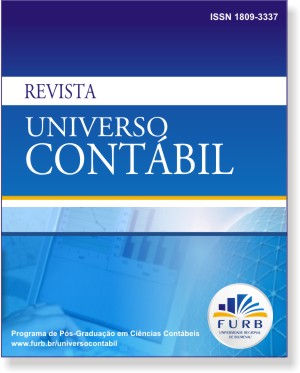CONSERVADORISMO NOS LUCROS CONTÃBEIS DOS BANCOS NO BRASIL: A INFLUÊNCIA DO CONTROLE ESTATAL
DOI :
https://doi.org/10.4270/ruc.20128Mots-clés :
Contabilidade, Conservadorismo condicional, Bancos, Exposição legal.Résumé
O artigo investiga a presença de conservadorismo condicional nos lucros reportados pelas instituições financeiras no Brasil, e examina se essa característica é diferenciada entre bancos estatais e bancos privados. O modelo de reversão de componentes transitórios do lucro proposto por Basu (1997) e o modelo de acumulações contábeis, desenvolvido por Ball e Shivakumar (2005, 2006), foram aplicados para testar a presença de conservadorismo condicional nos lucros reportados pelos bancos brasileiros. Também, se testou se os lucros reportados pelos bancos estatais são mais conservadores do que os reportados pelos bancos privados. Os dados comportam 260 bancos abrangendo o período de 1997 a 2010. Os coeficientes dos modelos foram estimados pelo método GMM Sistêmico, para tratamento da endogeneidade dos regressores. Apesar de o ambiente econômico e institucional brasileiro não incentivar a qualidade informacional das demonstrações contábeis, não se confirmou a primeira hipótese de pesquisa. Ademais, os gestores dos bancos estatais antecipam o reconhecimento de perdas não realizadas, reportando demonstrações contábeis mais conservadoras, provavelmente para reduzir a exposição ao risco de litígio com órgãos de controle do Governo; os achados, portanto não suportam a rejeição da segunda hipótese.
Téléchargements
Références
AHMED, Anwer S.; BILLINGS, Bruce K.; MORTON, Richard M.; STANFORD-HARRIS, Mary. The role of accounting conservatism in mitigating bondholder–shareholder conflicts over dividend policy and reducing debt costs. The Accounting Review, Sarasota, v. 77, n. 4, p. 867-890, Oct. 2002. http://dx.doi.org/10.2308/accr.2002.77.4.867
ARELLANO, Manuel; BOVER, Olympia. Another look at the instrumental variable estimation of error-components models. Journal of Econometrics, Amsterdam, v. 68, n. 1, p. 29-51, Jul. 1995. http://dx.doi.org/10.1016/0304-4076(94)01642-D
BALL, Ray. Infrastructure requirements for an economically efficient system of public financial reporting and disclosure. Brookings-Wharton Papers on Financial Services, 2001.
BALL, Ray; ROBIN, Ashok; SADKA, Gil. Is financial reporting shaped by equity markets or by debt markets? An international study of timeliness and conservatism. Review of Accounting Studies, New York, v. 13, n. 2-3, p. 168-205, Sep. 2008. http://dx.doi.org/10.1007/s11142-007-9064-x
BALL, Ray; SHIVAKUMAR, Lakshmanan. Earnings quality in UK private firms: comparative loss recognition timeliness. Journal of Accounting and Economics, Amsterdam, v. 39, n. 1, p. 83-128, Feb. 2005. http://dx.doi.org/10.1016/j.jacceco.2004.04.001
______. The role of accruals in asymmetrically timely gain and loss recognition. Journal of Accounting Research, Chicago, v. 44, n. 2, p. 207-242, May 2006. http://dx.doi.org/10.1111/j.1475-679X.2006.00198.x
BASU, Sudipta. The conservatism principle and the asymmetric timeliness of earnings. Journal of Accounting and Economics, Amsterdam, v. 24, n. 1, p. 3-37, Dec. 1997. http://dx.doi.org/10.1016/S0165-4101(97)00014-1
BLUNDELL, Richard; BOND, Stephen. Initial conditions and moment restrictions in dynamic panel data models. Journal of Econometrics, Amsterdam, v. 87, n. 1, p. 115-143, Aug. 1998. http://dx.doi.org/10.1016/S0304-4076(98)00009-8
BUSHMAN, Robert M.; PIOTROSKI, Joseph D. Financial reporting incentives for conservative accounting: the influence of legal and political institutions. Journal of Accounting and Economics, Amsterdam, v. 42, n. 1-2, p. 107-148, May 2006. http://dx.doi.org/10.1016/j.jacceco.2005.10.005
COELHO, Antonio Carlos D. Qualidade informacional e Conservadorismo nos resultados contábeis publicados no Brasil. 240 p. Tese (Doutorado em Contabilidade e Controladoria). Faculdade de Economia, Administração e Contabilidade, Universidade de São Paulo, São Paulo, 2007.
COSTA, Fábio M.; LOPES, Alexsandro B.; COSTA, A.C.O. Conservadorismo em cinco países da América do Sul. Revista de Contabilidade & Finanças, São Paulo, v. 17, n. 41, mai./ago. 2006. http://dx.doi.org/10.1590/S1519-70772006000200002
DECHOW, Patricia M.; KOTHARI, S. P.; WATTS, Ross L. The relation between earnings and cash flows. Journal of Accounting and Economics, Amsterdam, v. 25, n. 2, p. 133-168, May 1998. http://dx.doi.org/10.1016/S0165-4101(98)00020-2
FAN, Joseph P.H; WONG, T.J. Corporate ownership structure and the informativeness of accounting earnings in East Asia. Journal of Accounting and Economics, Amsterdam, v. 33, n. 3, p. 401–425, Aug. 2002. http://dx.doi.org/10.1016/S0165-4101(02)00047-2
FIRTH, Michael; FUNG, Peter M. Y.; RUI, O. M. Ownership, two-tier board structure, and the informativeness of earnings – Evidence from China. Journal of Accounting and Public Policy, Mayland, v. 26, n. 4, p. 387-526, Jun. 2007. http://dx.doi.org/10.1016/j.jaccpubpol. 2007.05.004
HUIJGEN, Carel; LUBBERINK, Martien. Liability exposure effects on earnings conservatism: the case of cross-listed firms. The Department of Accounting and Finance, Lancaster University, 2000.
LI, Xi. Accounting conservatism and cost of capital: international analysis. London Business School, 2010.
LOPES, Alexsandro B.; MARTINS, Eliseu. Teoria da Contabilidade – Uma nova abordagem. São Paulo: Editora Atlas, 2005.
LOPES, Alexsandro B.; WALKER, Martin. The relation between firm-specific corporate governance arrangements, cross-listing and the informativeness of accounting reports: the Brazilian case. Working Paper, Manchester Business School, The University of Manchester, 2010.
WATTS, Ross L. Conservatism in accounting part I: explanations and implications. Accounting Horizons, Sarasota, v. 17, n. 3, p. 207-221, Sep. 2003a. http://dx.doi.org/ 10.2308/acch. 2003.17.3.207
______. Conservatism in accounting part II: evidence and research opportunities. Accounting Horizons, Sarasota, v. 17, n. 4, p. 287-301, Dec. 2003b. http://dx.doi.org/ 10.2308/acch.2003.17.4.287
WOOLDRIDGE, Jeffrey M. Econometric analysis of cross section and panel data. Cambridge, Massachusetts: The MIT Press, 2002.
Téléchargements
Publié-e
Comment citer
Numéro
Rubrique
Licence
Os direitos autorais para artigos publicados nesta revista são do autor, com direitos de primeira publicação para a revista. Em virtude de aparecerem nesta revista de acesso público, os artigos são de uso gratuito, com atribuições próprias, em aplicações educacionais e não-comerciais. A revista permitirá o uso dos trabalhos publicados para fins não-comerciais, incluindo direito de enviar o trabalho para bases de dados de acesso público. Os artigos publicados são de total e exclusiva responsabilidade dos autores.
• O(s) autor(es) autoriza(m) a publicação do artigo na revista;
• O(s) autor(es) garante(m) que a contribuição é original e inédita e que não está em processo de avaliação em outra(s) revista(s);
• A revista não se responsabiliza pelas opiniões, ideias e conceitos emitidos nos textos, por serem de inteira responsabilidade de seu(s) autor(es);
• É reservado aos editores o direito de proceder ajustes textuais e de adequação do artigo às normas da publicação;
• O(s) autor(es) declaram que o artigo não possui conflitos de interesse.


